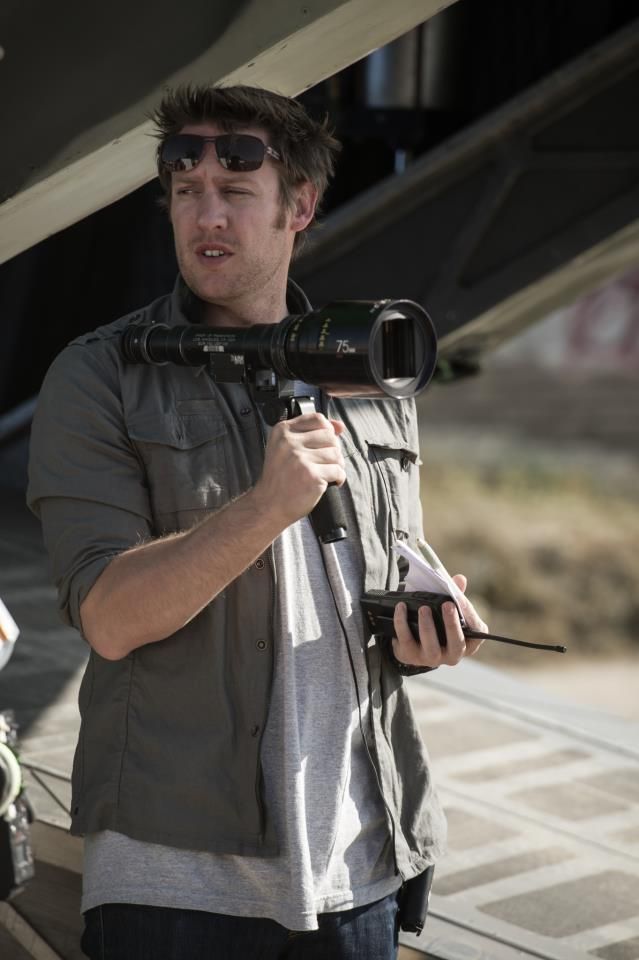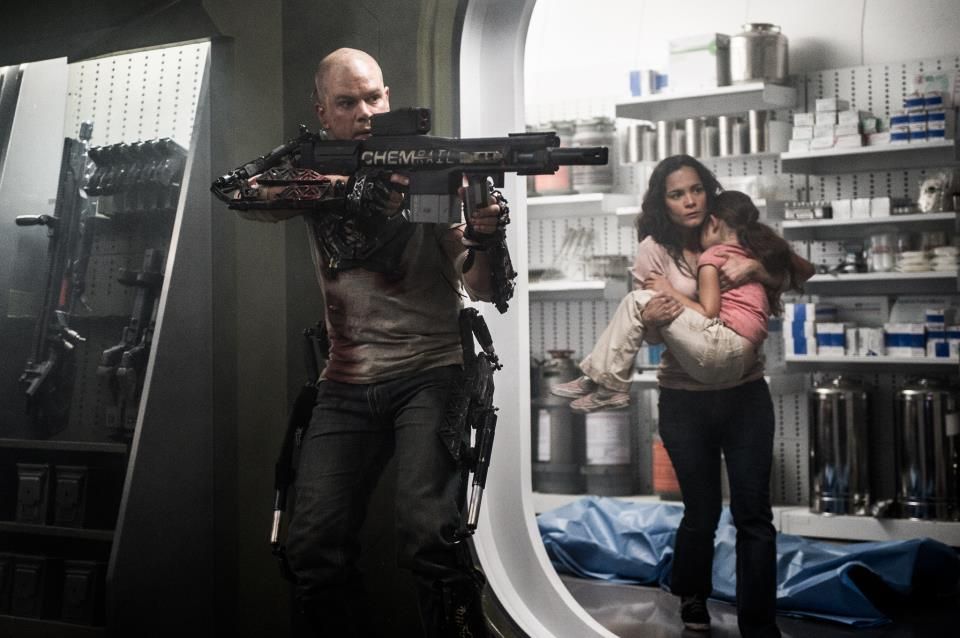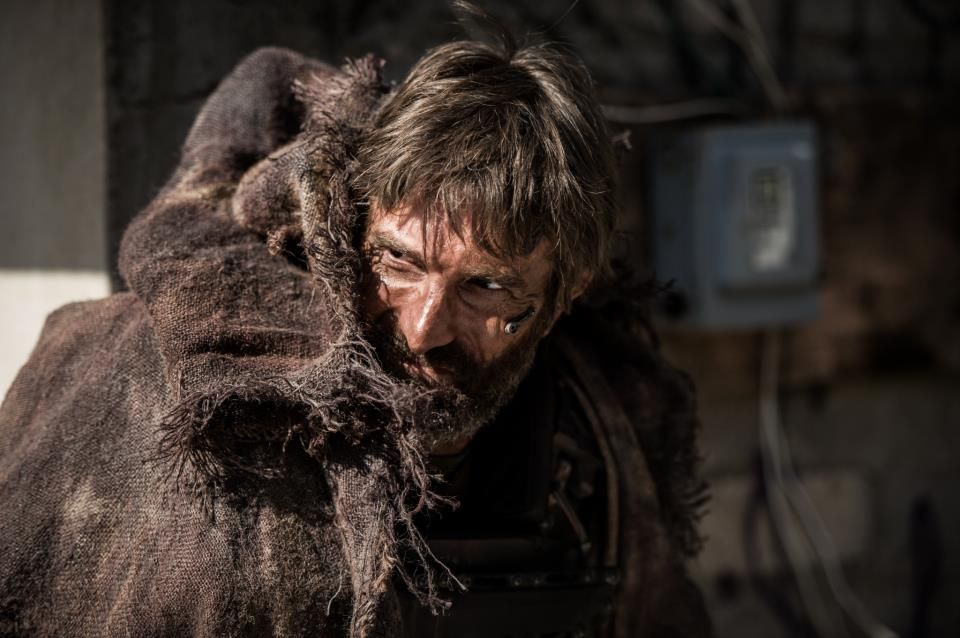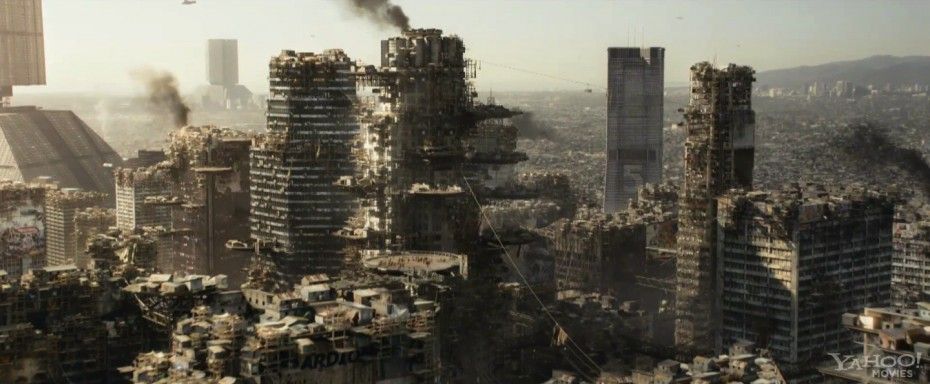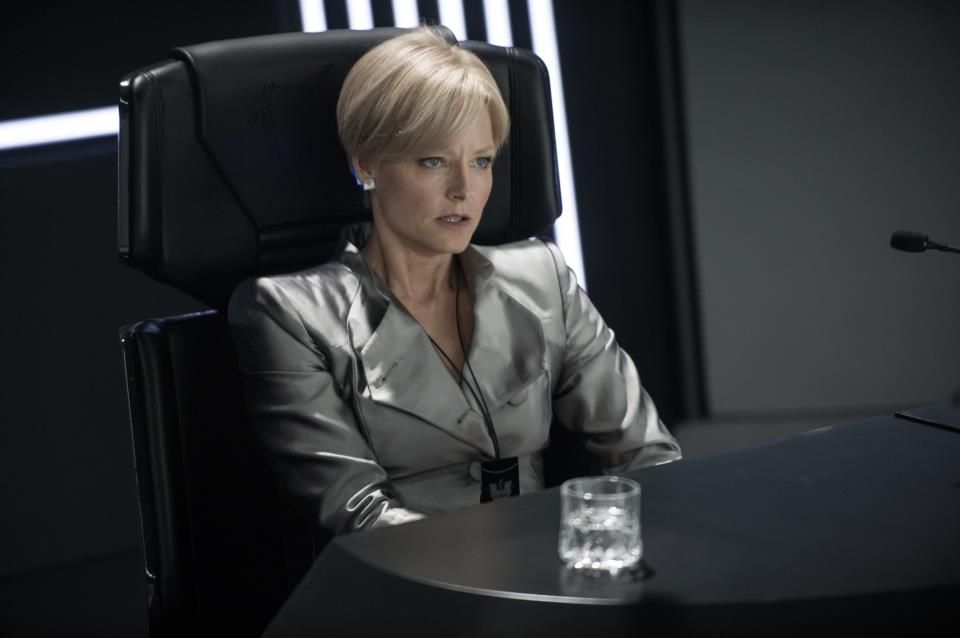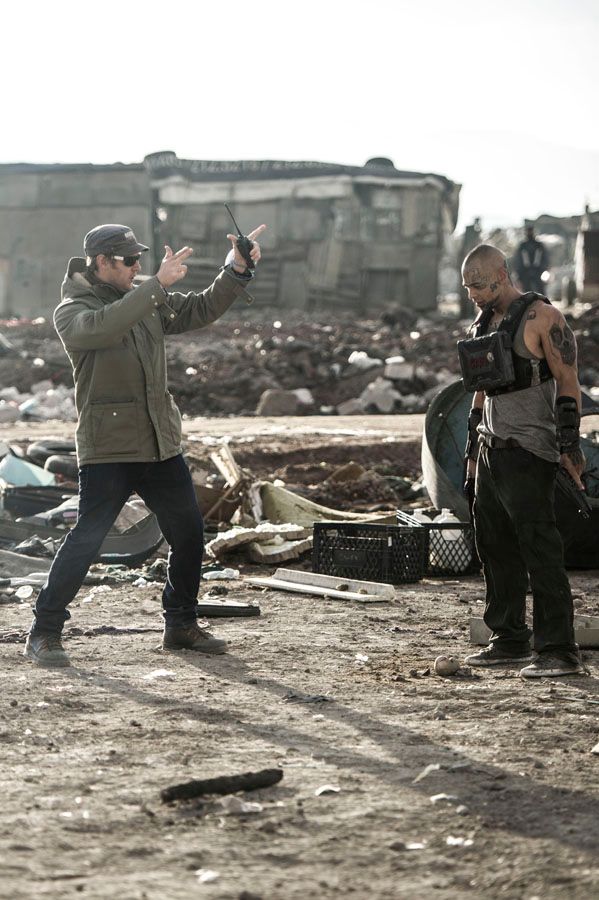On the surface, filmmaker Neill Blomkamp appears to have come a long way since District 9. For the 2009 sci-fi thriller, the South Africa native cast his best friend Sharlto Copley in the lead role and filmed on his home turf in Johannesburg. Four years later, his new movie Elysium stars Matt Damon and Jodie Foster and was filmed all over the world. But is it really so different?
Copley is still hugely present, this time as the villain rather than the hero. And while the new movie isn’t set in "Joburg," as Blomkamp refers to his birthplace, Elysium touches on many of the same socioeconomic struggles that District 9 portrayed so poignantly through the trials of a group of tentacle-faced aliens stranded on Earth.
Elysium concerns a not-so-distant future in which the human population has grown to such stringent proportions that the world's wealthiest have migrated off-planet to an idyllic ring that shares the movie's name. It's like Beverly Hills, only floating in space in space above an Earth that’s turned into one big, ugly ghetto.
Elyisum has a bigger budget, a more recognizable cast, and a more cinematic vision, but Blomkamp says it's exactly the movie he set out to make, and he made no compromises on it. Spinoff Online spoke at length with the filmmaker in Los Angeles about his past and upcoming projects, the issues he portrays in his films, the possibility of Eminem as a leading man, the ill-fated Halo movie he almost directed, and more.
Spinoff Online: How long has this idea sort of been percolating in your head? Was this something you've been wanting to do for a while?
Neill Blomkamp: Yeah, it's like, you know, these organic things that just sort of — you never really know when they begin or end, to a degree. I got arrested in Tijuana like — but no, it wasn't really fair, because I hadn't done anything. I just got — I got "shaken down" would be a better description, I think. And I ended up walking along weirdly, like, quite close to the U.S. border, and at night with, like, Black Hawks flying up and down because of the naval base. And that was when I was 25, so that was before District 9. And I always thought that that image and that concept, you know, that an hour before I was on the other side of the fence, stuck with me so much that I thought some day that would turn into something. And essentially Elysium really is that, you know, it's that event.
What's it like going from struggling to make a movie, to all of a sudden being able to, like, have the budget to do a shot or to set up the camera or to do what you want with, basically, freedom?
Yeah, well, you know what's interesting is I actually feel I'm at that point now after Elysium. I never actually felt that on Elysium, so I feel like it's been such a fight to get to where I am at now, that for the first time, I feel like going forward now I can actually now try to become a better filmmaker. I don't know if that makes sense, but it's like everything that I've done so far — it's like you're just trying to keep above water, you know? There's political stuff happening and there's so many things happening. But you know, you're learning which crew members you want to work with, which ones stab you in the back, you know, who changes, which positions works, which ones don't work. Now, for the first time, I feel like it's a flat plateau now. And it's like, if I want to, I can actually become a better filmmaker. Now I can actually get the noise away, like out of my head from other people, and hone the craft of filmmaking, you know? So hopefully 10 years or 20 years from now — if I don't die from Legionnaires' disease, which I thought I had on Monday — I will be a better filmmaker.
But to that point, I mean, District 9 starred your buddy Sharlto Copley, and then going after the success of District 9, you're able to get Matt Damon and Jodie Foster. It must have changed something for you.
Yeah, no, no, it did. It definitely did. I mean, there was […] love the financier of this film, Modi Wiczyk from MCR [Media Rights Capital], and I wrote to him when we were shooting the film, like halfway through it, and I basically was saying, "Thank you for allowing me to be an artist that can stand at a garbage dump in Mexico City shooting exactly what I want to shoot," you know? So yes, you're right, but the difference is even though you have the political ability to shoot what you want — and the film is what I want — you're still outside the realm of the film. You're still … figuring out the sort of — there's this static noise of, like, politics, and you're learning as you go, you know? Like, here's another way of thinking of it: Ridley Scott on his, like, 780th film now, just like arrives at set — it's like a machine. It's like a well-oiled machine, with crew members that just know him and know what he wants and everything just goes "ch-ch-ch-ch-ch" and he leaves, you know what I mean? It's like I want to get closer to where it's pure, just pure artwork, and there's isn't any other extraneous force in there that's kind of making you not focus 100 percent.
How do you feel about working with lesser-known actors versus working with actors like Matt and Jodie? How does that affect that journey toward becoming that well-oiled machine?
The actors fit into that very smoothly, actually, you know? It's more setting up the way that the structure of the film happens. The actors are the good part. It's — I do feel like I was very lucky on Elysium. A big part of it was kind of meeting the actors and making sure that I felt like they were people that are like me, that like, I don't really want to just go to parties and hang out on red carpets and stuff. It's like, it's about the film. And they all felt that way when I met them. So I feel like I kind of lucked out because it was a group of people that wanted to do the same thing, that were just professionals, and we just made the film, you know? And I think if you can continue to do that as a filmmaker then you're in a good place. But you know, every once in a while you can have someone who just kind of fucks the entire process up.
There was a story that Eminem was originally considered for this. How do you think they both seemed to fit? Like how did you make that transition?
Well, it's — the fact that that came out was slightly erroneous, only in the sense that the version of Elysium that I wanted Eminem for was not this film. It was a very different version. When I came up with the idea, after District 9, I was very much in this mindset — this sociological kind of mindset — of just all of this, this kind of Tijuana border-fence kind of thing and growing up in South Africa. I was just kind of interested in it. And I knew that I wanted to make a science fiction film about the "haves" and the "have-nots." And the original script that I had was purposefully much lower-budget and the set-up was completely different. There was no space habitat. The way that the rich lived was this, actually like this very cool idea that I want to one day turn into something else because I like it so much. But it was totally different, this one.
So in that low-budget, edgier, stranger film, in that context, I wanted, like, an unusual star, and that's when he was approached. But then what happened was the concept that I'm talking about that I liked never felt right for the story. It wasn't really designed for a haves/have-nots kind of story. So it kept not feeling right, so I shelved that, and then I came up with the idea of a physical ring that you could go to and that was lined with, like, Beverly Hills mansions. And the second that happened I just jacked the budget up by $60 million. And that changed the whole way I thought of it, you know? And then I was still apprehensive to use stars, but I thought, "If it costs more to get the ring made, you know, it's going to cost more anyway, why not try to make it more of, like, a cinematic experience rather than some under-the-radar kind of film?" And so my whole thinking kind of changed, and then I went through a list of people, and Matt was — I mean, Matt really was the only guy on the list, because a lot of other people come with — I'm just fearful of them messing with the script or, you know, doing something, and Damon has such a good reputation that way. So that's the story.
You wouldn't want Edward Norton then?
No [laughing]. I'm pretty sure that — yeah.
In addition to being actors, Matt and Jodie are both filmmakers in their own right. Did that make a difference for them to start understanding your vision and not want to mess with it?
Yeah. Yeah, totally, totally. I mean, it's even so much, like, understanding the vision, it's even beyond that. It's just the way that you work on-set. If someone understands that they're a part — they're a cog — of a very big machine, and they are filmmakers — I mean, Matt hasn't directed something yet, but he keeps almost directing something, and he knows exactly what it takes, and he's interested in it, right? So when that is your understanding, the way he described it to me was you're helping the director create this magic trick where you're basically fooling the audience for two hours into believing "X." And having an asset in someone who's trying to help you create that illusion means they'll do whatever they need to to help you create the illusion. Another way of looking at it is: "Where's my close-up?" You know? "My makeup doesn't look good. Da-de da-de da-de." You know? And it's like, that's a problem. That's something else. So it actually — it goes slightly beyond just — they can still be worried about their makeup, and want to help your vision, you see what I mean? But if they understand that they're — they really understand filmmaking — they know that it's about getting the shot before the sun goes down, and you don't have time to, you know, get your hair done.
Here's my challenge, though, and it's interesting that you're talking about a stranger or another version of Elysium: I loved District 9, and I came to this with that sort of interest in something raw and edgy, and so much of the stuff I felt like I could predict from start to finish. And it was beautiful to watch, and I love the social justice parts of it, but I'm interested in you, like, if you've now arrived at the Elysium of the Hollywood film scene, why not take that $100 million and do something really edgy and interesting, because you've got the chops and the credibility to do it?
It depends on the kind of film you want to make, you know? Elysium really is the film that I wanted to make. Like, it's, I think, you know, again, if I don't die of Legionnaires' disease, looking back on it, like, five films down the line it will continue to be — it may be the most expensive film, and it will probably be — it will be something I will eternally be proud of. So it was the film that I wanted to make. But as, you know, sort of answering your question, the next film I want to make is far lower budget than this and is fucking mental. And the next film after that, I think it may end my career. It's like a, it's a comedy that may — I don't even know what will happen. And I like that I don't know what will happen, you know? If it's like too volatile, and people just hate it, and I get booted out of Hollywood, I can go back to, like, painting paintings or something, right? But to have a bunch of low-budget, very interesting, super-edgy films, and not have something cinematic — my whole goal with this was cinema. Like big-scale cinema and archetypal storytelling and archetypal, you know, lead character. I would not be happy to be a guy that didn't have that in my body of work. So that's really, you know, that's really the thinking.
You brought up the socioeconomic issues, and one thing in this that I'm looking at is race relations as well -- and I know you mentioned Tijuana, but can you talk a little bit about how you sort of divided the races? I saw one black guy in the L.A. kind of pit or whatever —
In future L.A.?
Yeah. And then at the end I saw it looked like in Africa or something —
Oh yeah, oh, yeah.
How did you go about decided what you were going to show? The people up on Elysium seemed to speak largely French and English, and I'd like to know how you got to that as well.
OK. Yeah, no, sure. This is basically the idea, right? There's two things: the one is metaphor and just trying to stick true to metaphor. So when you're talking about metaphor, right now — I specifically didn't want to include China because it just complicates things — but right now wealth is contained within North America and Europe. So they're going to be speaking English or European languages. And it happened to be French because Jodie is fluent in French. So you would presumably have many other languages happening on the station within European languages, to hold true to the metaphor. So that's the metaphor part of it. The other metaphor part actually is wanting to — it's like me being in Tijuana. It's like wanting to flip the point of view for Americans, where this is what it feels like to be on the other side of the fence looking over the fence, you know. In this case, it's looking up at Elysium, but it's kind of flipping America into a dilapidated, broken, more economically depressed America. So I wanted those two things, the languages on the station and the metaphor of America being broken.
And then the third thing is painting this realistic image of a future Earth that is my realistic version of a future Earth, which meant the borders being erased entirely and having this fluid population group that basically moves from Chile all the way up to Canada. It just flows, because it can. It's kind of like the EU [European Union]. Like, much more — like the EU on steroids. […] I just wanted that to feel real, like, as real as possible, and the numbers of people that are Latin are going to overwhelm the numbers of people that aren't. And if you, again, hold true to the metaphor, the wealth would have gone to the station. The only thing that didn't stick true to the metaphor or the realism part was that in Mexico City I couldn't get enough black actors. I tried as hard as I could, and the only black actor that I could find in Mexico City was the kid at the end who's running when you see the three ships landing and he goes and tells his parents the ships are coming. [He] was literally the only guy that I could find. That's how — it's just insane in Mexico how few actors there were. So the other shot that you were talking about I shot in Johannesburg when I was shooting a test for the new film that's half the size of Elysium. When I was shooting a test for that I was trying to do exactly what you just brought up. And I was like, "We should roll some footage of people running to the ships while we're here." And that's what that was.
I'm curious about how on every film you sort of learn a little bit about the craft, and I've spoken to David Fincher before, and he was talking about how he doesn't use cranes on set so he can keep the $5,000 per day to use toward a meal penalty or something like that. He was telling me the way he breaks everything down. I'm curious what you learned —
Yeah, sure [laughing].
What?
No, I was just thinking about the concept of Fincher being efficient with money [laughing].
Well, it was just an interesting conversation, the way he thinks about things. And I'm just curious what you learned on Elysium with having this much money. You talked earlier about making everything fluid on a set, you know, not dealing with the politics. What did you learn about big budget filmmaking that you can apply if you ever do have another budget on this level?
You know what? To be honest, it was the same as District 9, because it was trying to punch above its weight the same way District 9 was. So production, there was three times as much money, right? But there were four times as many requirements. So it felt as stringent as District 9. There was actually no different approach to the way that we made it. It was like everybody was under the same amount of pressure. I was a little bit more prepared, which helped, you know, like in terms of what shots I wanted and how I wanted to do things. And the actors, like the Jodies and the Matts that are such consummate professionals, they actually sped it up. It was pretty quicker than District 9, actually, because they just do exactly what you ask them to. I don't know if that answers the question though.
I'm curious about the behind-the-scenes --
Oh, I see what you mean. Right, I thought you meant production.
Well that, too. I'm just curious about also the behind-the-scenes stuff, whether it be camera rentals or whether it be certain things that you — you know what I mean?
No, it's all the same. It's all the same. It really is the same, like, the smarter thing for the filmmaker to learn is just the political stuff. It's just how, like on Elysium I had extreme amounts of control for a director at this budget level that's only done two films. But you can still do better, you know? You can still get it to the point — I want to get as close to, like, sketching artwork listening to headphones. I want to get as close to that process making a film as I can. And you just have to be smarter and smarter about how you set the films up, and you know what the people that are giving you the money to make the films with are — how big the playground is, you know? And how alone you will be left.
You talked about future projects that you have in your head. Do you see yourself in the foreseeable future continuing to do your own projects as opposed to taking on someone else's franchise, like a Marvel movie or Star Wars or something?
Right. I don't see myself taking on — I mean, maybe. Maybe. You know, this is my thought process: My thought process is — it's exactly what I was just saying. I just want to be an artist that's just left alone. That's really what I want, right? And I just want to — I want to make stuff that just — films are the only art form that require commerce so desperately. Like, you know, any other artist needs a few dollars for a paint brush, really, if you think about it. Like musicians or authors, they can be as free as they want. This is the one thing that just needs like copious amounts of money. So if you imagine a filmmaker trying to just be left alone as much as possible and make Star Wars, how does that work exactly? And it kind of doesn't. But —
Until you make a shitload of money and then can do it yourself.
Yes. And that's my style. That's what I want to do.
I mean, don't you feel like you're left alone? I imagine you are left alone
to a degree.
On those — you see, this is the thing: Let's say the contract says, "Leave Neill alone, and you'll get sued if you don't," right? Even if you do that, you will still have people — you'll have so much static noise of like, "We know you don't have to do this, but we really think Darth Vader, in this film he should be green and not black," you know what I mean? So I don't even want to hear that. I just want to hear nothing. So this is my thought process. The process is to have other brains that have thought of and come up with this kind of canon and like, you know, literature that is stacked this high of this mythology that's like very cool and super interesting and I can draw from this — thousands of other minds that have thought this stuff up — that's a hyper-appealing thing. Because it's, like, actually in a way it's more creative. You can already envision everything. It's been done for you. So that is very tempting. But I know the expense that comes with it, you know? And it's just currently at this point I'm not willing to do that, you know? That's really the thinking. But that doesn't mean that I'm unbelievably, you know, yearning to work with some of those franchises. Like, even the ones that affected me when I was a kid, you know? It would be so cool to do them.
Did you feel like you had a lot of people in your ear on Elysium?
Not really. I mean, relatively, no. It was actually — I was lucky, I think, you know, it was set up well.
I'm sure you're sick of talking about this, because it's in the past, but is that one of the problems that came up with the Halo movie?
Well, Halo, dude, Halo would have been — that's like, imagine someone just getting flogged for like — like some sort of Singapore, like, corporal-punishment thing, like, that would be me directing Halo. The only thing that made a huge difference to the situation would have been Peter Jackson. Like, PJ could have been some sort of interference shield that may have made some quite radical difference to the way that I would have gone through that particular meat grinder. No, that is just literally a very different scenario. I mean, I'm just a different filmmaker now. Like, I cannot imagine the shit that would have gone down if that production had actually been made. But Peter may have been able to shield me from it and, you know, possibly. The world of Halo, though, and the mythology of Halo, is still something that I find — it's like Star Wars, you know? It's like, it's just, again, it's so appealing to me, because it's cool and it's there and it's like I can imagine it. But you have to do it in a way that you can do it yourself.
The mythology is really cool, and it would have been amazing if you had done it. It does seem like some of the ideas from Halo — particularly the ring world — made it into Elysium. How much of that was a conscious thing?
Consciously? Nothing. Subconsciously, it's impossible to know. But yeah, consciously it wasn't meant to be anything. I mean, even the ring. The one thing about Halo that I always wanted was, like, I always felt that the ring was like, incomprehensibly — it was too big, and it didn't have any buildings on it, which drove me insane. It was just nature. The only way that you could see something cool was you had to get into the substructure of it. And that always used to irk me, when I was working on the film. I was like, it's too — it's just nature. It's just a bunch of dudes in nature the whole time. So, you know, yeah — maybe there was a subconscious thing with, like, fleshing out a ring that actually has, you know, suburbia on it. But no, consciously, not much. We also didn't — the version that we were making was a little bit … it hadn't gone far enough down the road that I could pull ideas like that with. More what I had done was things like fleshing out what all of the different creatures looked like, and the planets, and the tone and the vibe of it, you know what I mean? More than conceptual ideas. Hadn't really gone there yet.
I'm curious about your thoughts on Kickstarter, and if it's something you could ever consider using for, say, a radical idea — for source funding.
Yeah, no, I mean, I think the core idea of it is really brilliant, you know, and is an extension of the linked global world that we live in now. And it's also the most democratic version of funding something. It hasn't occurred to me to use it yet, because — I don't know, actually. I've done — the comedy that may end my career is sort of financed, so I feel like I'm OK. If that got un-financed I'd have to go see about other —
That's the second film?
Yeah.
Your next project is a sci-fi comedy.
Yeah, Chappie, yeah.
Have you released a one-liner for this thing, or is it still under wraps?
No, I'm trying to keep it as under wraps as possible, but it's — I don't know if I would describe it as a comedy. It's sort of — it's science fiction. It's totally different to these two films, but it has funny elements to it.
What's your shooting schedule/release plan?
The release plan is unknowable at the moment, but the schedule is shoot it the rest of this year and do post next year — most of next year.
Do you have a studio behind it?
I'm about to have a studio behind it. I think. Soon.
So basically you're working out the contracts or whatever.
Yeah, yeah. But it will get made. I mean, right after Elysium comes out I'm going to Joburg to start making the film. So it's happening. I love it, I absolutely love that film. Like, seriously. I love it. I'm so excited about it it's insane.
And that's not the same as the comedy you mentioned earlier, the one that's going to ruin your career?
No, I'm even more excited about that one, though [laughing].
Are you in the casting process?
For Chappie?
Yeah.
For Chappie I'm almost done, actually. There's one more role. There's one more role, which was offered to someone that is very unusual, who just turned me down, which I'm upset about. But there's — yeah, I've got to find someone for that role.
Was it Eminem?
No, it wasn't Eminem [laughs].
Elysium opens Friday nationwide.


